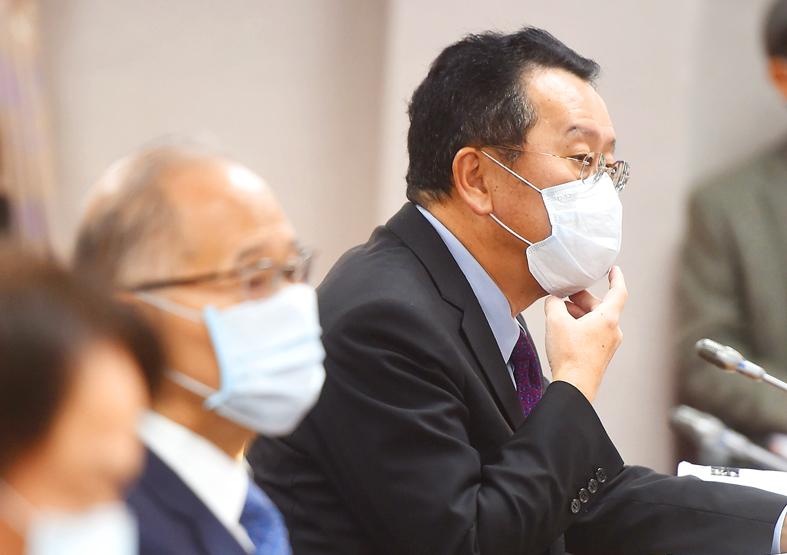The National Security Council (NSC) is to bolster information security by strengthening its joint national-level security structure over the next year, establishing a data-driven proactive defense system, and securing the nation’s data channels and supply chains, NSC Secretary-General Wellington Koo (顧立雄) said yesterday.
Koo unveiled the three goals while reporting national defense budget plans for next year to the Legislative Yuan’s Judiciary and Organic Laws and Statutes Committee.
The council has five main priorities for the coming year, he said.

Photo: Chien Jung-fong, Taipei Times
First, it would accelerate development of Taiwan’s asymmetric combat capabilities, bolster the reserve system and improve management of the nation’s armed forces, he said.
Second, it would defend the nation’s sovereignty and regional stability by promoting diplomatic relationships and substantive participation in the international community, he said.
Third, it would maintain peace and stability in the Taiwan Strait by understanding internal and external changes that might affect the current status, Koo said.
Fourth, it would enhance the capabilities and resilience of the homeland security system to more effectively respond to threats such as natural disasters and terrorist attacks, he said.
Fifth, the council would improve its “information and national security strategy 2.0” by implementing a proactive defense system to create a resilient and secure “smart nation,” Koo added.
Information security is of paramount importance in nearly every segment of society, but it faces threats that increase by the day, Koo said.
In responding to the threats, the council would focus on three priorities, he said.
First, the NSC would focus on upgrading the national-level joint defense system and the team focused on information security, he said.
Second, the council would work with its partners in the public sector and abroad to establish a data-driven proactive defense mechanism, he said.
Third, it would promote information security within industry, and support cybersecurity firms to enhance the nation’s independence and capabilities in the field, he added.
The council ultimately hopes to enable “early warning, emergency response and continuous operations,” and become the world’s trusted source for secure systems and supply chains, Koo said.
This way, Taiwan could secure its cyberspace and critical infrastructure from attacks, he said.

Taiwan has received more than US$70 million in royalties as of the end of last year from developing the F-16V jet as countries worldwide purchase or upgrade to this popular model, government and military officials said on Saturday. Taiwan funded the development of the F-16V jet and ended up the sole investor as other countries withdrew from the program. Now the F-16V is increasingly popular and countries must pay Taiwan a percentage in royalties when they purchase new F-16V aircraft or upgrade older F-16 models. The next five years are expected to be the peak for these royalties, with Taiwan potentially earning

STAY IN YOUR LANE: As the US and Israel attack Iran, the ministry has warned China not to overstep by including Taiwanese citizens in its evacuation orders The Ministry of Foreign Affairs (MOFA) yesterday rebuked a statement by China’s embassy in Israel that it would evacuate Taiwanese holders of Chinese travel documents from Israel amid the latter’s escalating conflict with Iran. Tensions have risen across the Middle East in the wake of US and Israeli airstrikes on Iran beginning Saturday. China subsequently issued an evacuation notice for its citizens. In a news release, the Chinese embassy in Israel said holders of “Taiwan compatriot permits (台胞證)” issued to Taiwanese nationals by Chinese authorities for travel to China — could register for evacuation to Egypt. In Taipei, the ministry yesterday said Taiwan

‘LIKE-MINDED PARTNER’: Tako van Popta said it would be inappropriate to delay signing the deal with Taiwan because of China, adding he would promote the issue Canadian senators have stressed Taiwan’s importance for international trade and expressed enthusiasm for ensuring the Taiwan-Canada trade cooperation framework agreement is implemented this year. Representative to Canada Harry Tseng (曾厚仁) in an interview with the Central News Agency (CNA) said he was increasingly uneasy about Ottawa’s delays in signing the agreement, especially as Ottawa has warmed toward Beijing. There are “no negotiations left. Not only [is it] initialed, we have three versions of the text ready: English, French and Mandarin,” Tseng said. “That tells you how close we are to the final signature.” Tseng said that he hoped Canadian Prime Minister Mark Carney

Taiwan is awaiting official notification from the US regarding the status of the Agreement on Reciprocal Trade (ART) after the US Supreme Court ruled US President Donald Trump's global tariffs unconstitutional. Speaking to reporters before a legislative hearing today, Premier Cho Jung-tai (卓榮泰) said that Taiwan's negotiation team remains focused on ensuring that the bilateral trade deal remains intact despite the legal challenge to Trump's tariff policy. "The US has pledged to notify its trade partners once the subsequent administrative and legal processes are finalized, and that certainly includes Taiwan," Cho said when asked about opposition parties’ doubts that the ART was